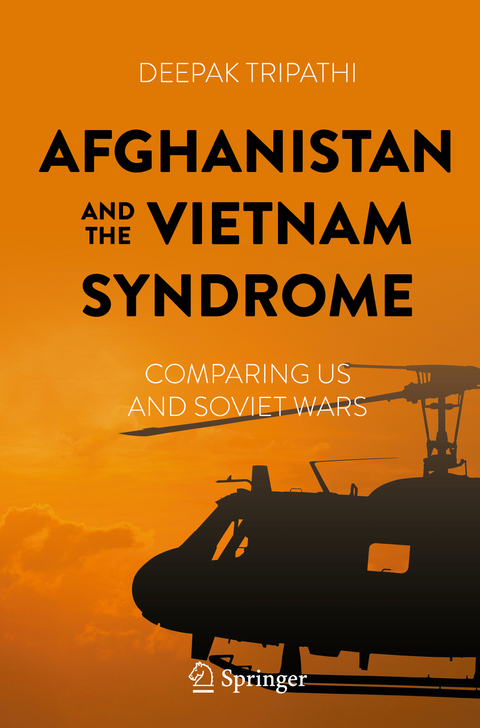
Afghanistan and the Vietnam Syndrome
Comparing US and Soviet Wars
Seiten
2024
Springer International Publishing (Verlag)
978-3-031-23557-3 (ISBN)
Springer International Publishing (Verlag)
978-3-031-23557-3 (ISBN)
Great powers have often found that military adventurism to force their will in distant lands comes with the risk of spending excessive military, economic, and moral capital to the extent that war is no longer sustainable. Written by a former BBC Afghanistan correspondent who set up the corporation's bureau in Kabul in the early 1990s, this book draws both from scholarly knowledge as well as first-hand insights on how the Americans met that fate in Vietnam, and the Soviets and Americans in Afghanistan. America's 1975 retreat from Vietnam was a consequential event, prompting US commentators to explain it as reluctance to get involved in foreign wars, a mindset described as the Vietnam Syndrome.
As Deepak Tripathi points out, the Vietnam experience made the Americans determined to give the Soviets their own Vietnam. The 1979 Soviet invasion of Afghanistan, and retreat after a decade of occupation, represented the revenge America sought. However, President George W. Bush's decision to invade Afghanistan after the 9/11 attacks was the beginning of a long military venture that ended in retreat in 2021. Addressing an academic as well as a general audience, Tripathi explores parallels between wars in Afghanistan and Vietnam, and shows how the United States and the Soviet Union met the same fate.
As Deepak Tripathi points out, the Vietnam experience made the Americans determined to give the Soviets their own Vietnam. The 1979 Soviet invasion of Afghanistan, and retreat after a decade of occupation, represented the revenge America sought. However, President George W. Bush's decision to invade Afghanistan after the 9/11 attacks was the beginning of a long military venture that ended in retreat in 2021. Addressing an academic as well as a general audience, Tripathi explores parallels between wars in Afghanistan and Vietnam, and shows how the United States and the Soviet Union met the same fate.
Deepak Tripathi, PhD, is a Fellow of the Royal Historical Society, and a Fellow of the Royal Asiatic Society of Great Britain and Ireland. A former journalist, Tripathi worked for the BBC for 23 years as a foreign correspondent, commentator, and editor. As the BBC Afghanistan correspondent, he set up the corporation's bureau in Kabul in the early 1990s. He also reported from Syria, Pakistan, Sri Lanka, and India. Tripathi is the author of a Middle East trilogy.
Chapter 1. 9/11 Reprisal.- Chapter 2. Overreach.- Chapter 3. War On Terror.- Chapter 4. Afghan War.- Chapter 5. Iraq War.- Chapter 6. Arab Spring.- Chapter 7. Return to Kabul.- Chapter 8. Conclusion.
| Erscheinungsdatum | 06.03.2024 |
|---|---|
| Zusatzinfo | XXV, 173 p. |
| Verlagsort | Cham |
| Sprache | englisch |
| Maße | 155 x 235 mm |
| Themenwelt | Sozialwissenschaften ► Politik / Verwaltung ► Europäische / Internationale Politik |
| Sozialwissenschaften ► Politik / Verwaltung ► Vergleichende Politikwissenschaften | |
| Schlagworte | 9/11 • Afghan War • Al-Qaeda • arab spring • Desert Storm • Donald Trump • Global politics • Iraq • Islamist Terrorism • Joe Biden • Middle East • Operation Iraqi Freedom • Pakistan • Soviet invasion • Taliban • Vietnam War • War On Soviet Communism • War on Terror • Wars |
| ISBN-10 | 3-031-23557-6 / 3031235576 |
| ISBN-13 | 978-3-031-23557-3 / 9783031235573 |
| Zustand | Neuware |
| Informationen gemäß Produktsicherheitsverordnung (GPSR) | |
| Haben Sie eine Frage zum Produkt? |
Mehr entdecken
aus dem Bereich
aus dem Bereich
Studienbuch
Buch | Hardcover (2023)
De Gruyter Oldenbourg (Verlag)
44,95 €
Amerikas Strategie der Vorherrschaft und der Kampf um Eurasien
Buch | Softcover (2024)
NOMEN Verlag
20,00 €
erfolgreiche Interessenvertretung durch Prozesskompetenz im komplexen …
Buch | Hardcover (2023)
Wiley-VCH (Verlag)
42,00 €


